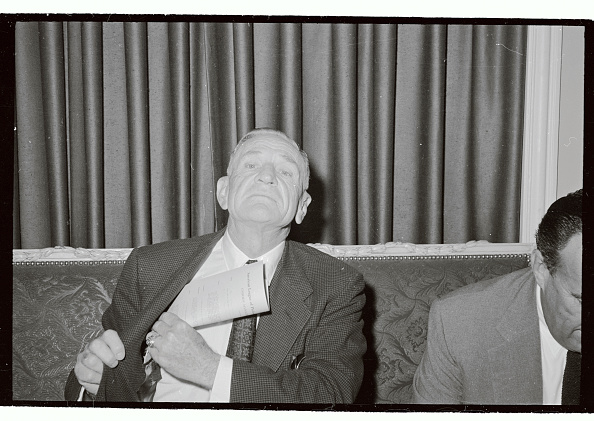With our archives now 3,500+ articles deep, we’ve decided to republish a classic piece each Friday to help our newer readers discover some of the best, evergreen gems from the past. This article was originally published in May 2011.
This is a guest post by Tyler Tervooren of Advanced Riskology.
It’s learning how to negotiate to keep both sides happy – whether it’s for a multi-million dollar contract or just which show to watch on TV, that determines the quality and enjoyment of our lives. —Leigh Steinberg
My old man was a master haggler; he could strike a deal with darn near anyone for darn near anything. To say I learned a lot about making deals while growing up would be an understatement. From buying a TV at the department store to negotiating over a used car in the local classifieds, my dad always ended up with a great deal, and he usually took me along to witness it firsthand.
Today, haggling is one of my favorite hobbies, and it has nothing to do with being cheap or trying to “win.†I simply enjoy the exchange between two sharp men that turns a mediocre deal into a great one for both parties.
Depending on where you are in the world, negotiation is either a part of everyday life or an uncomfortable practice that’s consciously avoided whenever possible.
But here’s a truth that many of us, especially those of us living in the Western world, don’t always consider: whether or not you realize it, every interaction you have with another person is a negotiation. From picking a romantic date with your wife to finding an agreeable price for some tchotchke gift with the local thingamajig salesman, we’re navigating a world of back and forth negotiation.
If you accept and embrace that, you can become much better at it, getting what you want from your life and feeling more fulfilled. If you reject it, your other choice is to take what’s given you and hope that it matches what you want. I learned from Dad long ago that the first option comes with better odds.
To become a better negotiator and, subsequently, create a better life for you and your family, the first hurdle to get over is breaking down all the myths we’ve come to believe about haggling. Things like:
- Haggling is too argumentative. Only if you’re doing it wrong! Effective haggling doesn’t look or feel anything like an argument, and there’s little or no friction involved. In fact, done just right, it feels like an everyday conversation that you’d have with a friend. Good haggling actually builds respect between two people rather than diminishes it.
- Haggling is for cheapskates. Ask any wealthy person if they got where they are by taking every deal that came their way at face value. Of course they didn’t! They knew exactly what they wanted and decided how much they were willing to give up to get it. Billionaire CEOs haggle with each other every day over multi-million dollar deals. You only look like a cheapskate when you become petty, not when you work hard to get a great deal on something that’s important to you.
- Haggling is inappropriate. Yes, arguing over the price of a Coke at a 7-11 is probably inappropriate and it definitely makes you look like a cheapskate, but sincerely asking for consideration when you’re pursuing something valuable to you is never inappropriate and no one thinks less of you for doing it.
- Haggling isn’t worth the time or savings. A good negotiation definitely takes time to complete, but it’s almost always worth the outcome. Some of my most successful haggles have resulted in as much as 50% savings on big-ticket items. I don’t usually even bother to negotiate unless I think I can save $100/hour or more for the work.
- I don’t have the aggressive personality it takes to haggle. Good haggling is simply an exchange between two people trying to find a win/win deal. You do not need to be aggressive to do it effectively. In fact, if you’re the domineering type, that’ll often work against you more than it will work for you.
Find Many Paths to Success
If you come to a negotiation table saying you have the final truth, that you know nothing but the truth and that is final, you will get nothing. —Harri Holkeri
No matter whom you’re crafting a deal with, one of the most fatal negotiation mistakes I’ve learned to avoid the hard way is to get yourself wrapped up in just one possible outcome. If you don’t get it, there’s nowhere else to go. Why limit yourself to such a narrow definition of success?
A great negotiation should be fluid and evolve as you and your partner (notice how I said partner, not adversary) get to know each other’s goals. Setting your sights on only one scenario ruins any chance that your haggle will develop a natural flow that fits both parties.
This is sort of like creating your imaginary perfect girlfriend long before you ever meet someone and comparing any woman you meet to this illusion. One of them is fun to think about but always ends in frustration. The other is the key to happiness, but doesn’t fit the exact mold you’ve created in your mind. You’ll never find the perfect match, woman or otherwise, if you limit yourself to just one set of circumstances.

Always look for multiple outcomes.
It is a bad bargain, where both are losers. —Ancient proverb
I was just a kid in 1994 when the World Series was canceled because the players and owners couldn’t play together nicely.
Owners wanted to institute salary caps to spare themselves from ridiculous bidding wars and players wanted contracts that weren’t subject to renegotiation every season. For months, neither side would consider the other’s argument and the result was hundreds of canceled games and, as I recall, some really pissed off little leaguers.
When the two sides finally came together, they did so begrudgingly and the deal they reached suffered tremendously because of it. The owners ended up losing hundreds of millions of dollars and the players saw an average salary decrease of 5%. A lose/lose deal if I ever saw one.
When you come to the table with as many different options for success as possible, good deals come faster and easier.
Never Speak First
Let us never negotiate out of fear. But, let us never fear to negotiate. —John F. Kennedy
Just a few days ago, I was hanging out with a friend when he remembered the garage sale drill press in the basement I’d bought a few years ago and never used. We started talking about it and all the great projects I should have known at the time I would never use it on (I spent a few years trying to convince myself I was into woodworking to no avail), when he mentioned that he had just the project he needed it for and offered to buy it.
I was excited at the prospect of getting paid to get rid of something that reminded me of a failed hobby, so I immediately blurted out, “Hey, if you’ve got $20, it’s all yours.†I don’t even remember how much I paid for it, but Paul must have thought it was a pretty good offer because he practically had the money out of his wallet before I could finish the sentence.
Now, between two pals, this is no problem. I was getting rid of a bad memory and Paul was getting a great deal, but it’s a good example of a big negotiation faux pas: never say the first number.

Never say the first number.
If possible, always defer to the other party when finding the starting number because it gives you a lot of information to work with in determining the best strategy going forward. It’s like having the home team advantage at a baseball game (this’ll be my last baseball reference, I promise). If the first number isn’t close to what you’re looking for, you can immediately decide to either not waste anymore time negotiating or come up with a strategy that draws the deal away from the dollar amount and towards something else valuable to the other party.
This trick I learned from my old man earned me $10,000 a year during my first salary negotiation. Going into it, I’d undervalued myself, but by insisting I couldn’t make the first offer, I ended up negotiating a number much higher than I’d originally expected.
In my example with Paul, I probably left a fair bit of money on the table by making the first move. It was obvious he was ready to pay more if I’d asked for it. No sweat for a friend, but certainly a disappointment otherwise.
It Ain’t All About Money
Flattery is the infantry of negotiation. —Lord Chandos
Use the words haggling, bargaining, or negotiating in a conversation, and just about everyone will assume you’re talking about money. For a great haggler this certainly doesn’t have to be the case. In fact, the more you draw your negotiation away from numbers, the more likely, it seems, you’ll end up with one that’s closer to what you want.

Draw the negotiation away from money and you’ll get closer and closer to the dollar figure you want.
Numbers are very linear, so we’re hardwired to pick one and stick to it as much as possible. But numbers don’t stand alone; they’re usually influenced by some type of emotional attachment you have to whatever you’re bargaining over. A number itself is irrelevant. What matters is knowing why someone picked the one they did and then finding ways to meet that person’s needs in ways that make the number less important, giving it more room to budge.
Was that a little hard to follow? Let me give an example from my own life of what I’m talking about.
I have a lovely girlfriend. She owns a bakery in Portland and always brings home delicious leftovers. Since she has a passion for food and spends most of her days preparing it for other people, she likes to go out and be waited on. A lot. In the past, this was a friction point between us because I hated spending so much money dining.
For the longest time, I thought the only way to satisfy her was to go out for lots of expensive meals when really all she wanted was someone to pay attention to her (ahem . . . that’d be me) and make her feel like she was being treated to something special. Once I realized that, the regular $50 and $100 dinners weren’t important any more. Price meant nothing to her; the experience is what she cared about. I could cook her a meal at home and she’d love it. If we wanted to go out, I could pack a picnic and head to a park for lunch and she’d be over the moon.
It took me awhile to realize this, but once I did, finding the perfect alternative to a wallet-busting dinner out has been easy.
Price is rarely the final deciding factor in a negotiation. It gets a lot of attention because it’s the easiest metric to focus on, but if you take the time to find the intangibles that your counterpart really values, your haggling job gets a whole lot easier.
If Someone Loses, You Did it Wrong
Any business arrangement that is not profitable to the other person will, in the end, prove unprofitable to you. The bargain that yields mutual satisfaction is the only one that is apt to be repeated. —Henry R. Luce
I used to manage projects for a large construction firm. Late one afternoon, I was strolling through one of my projects across town, checking out the progress for the day and making sure we were still on schedule. The doorframes were all supposed to be installed, so I was paying particularly close attention to them. Sure enough, they were all there — just what I expected from the top-rate installer we’d hired.
I was about to leave when I got the strange feeling that something just wasn’t quite right. I wandered around for 10 minutes and then I realized it — every single doorframe was the wrong color. Every one of them! $100,000 worth of custom metalwork — totally wrong.
In lots of situations like this, here’s how the conversation would go between the project manager and the doorframe supplier (expletives removed for common decency):
Project Manager (PM): All your frames are the wrong color. You need to take them down, get new ones, and reinstall them.
Door Guy: Sure thing, boss. That’ll be $100,000. How would you like to pay?
PM: Umm, no. You $*%&$# this up. You’re going to fix it at no cost, and we’ll bill you for any delays to the project.
Door Guy: But that’s going to cost us a fortune, and we’ll never finish in time! This could bankrupt us!
PM: Not my problem. I want the right frames, and you can pay the owner and all the other trades for the time they lose thanks to your #$&% up. See you tomorrow.
I was mad as hell, and I could have said just that to the supplier, and it’s what they’d have had to do. In the end, the project would have been just right, but literally everyone involved would have been upset about it, and I’d probably still be dealing with papers from the court case that would have ensued afterwards.
Luckily, I learned a valuable lesson from my old man about being a hard ass dealmaker: Don’t try to be the victor. Avoid zero-sum games where someone else has to lose in order for you to win. If you negotiate like that, you’ll probably win a few, but you’ll lose just as many and kill a lot of good relationships along the way. Instead, find a way for everyone to win.

Avoid zero-sum games. Try to find a way for everyone to win.
So, what did we end up doing about all those doorframes?
We stopped the project for a day, sat down with the door supplier and the owner, and worked out a deal that allowed them to repaint the frames rather than toss them out, gave a reasonable discount to the owner, and saved the project schedule so that we all looked good.
Today, when you walk into that office building, the color of the doorframes isn’t exactly right, but there are only a few people who know it, and none of them care. Three months after that fiasco, we had another multi-million dollar contract with the same client. They liked how we handled their project. And guess who supplied the doors?
Less is More — Know When to Shut Up
We don’t point a pistol at our own forehead. That is not the way to conduct negotiations. —Benjamin Netanyahu
My old man is the strong, silent type. I learned early on that Dad doesn’t talk a lot, but when he does, it’s probably important. This quality came in handy when it was time to do business because one of the most powerful ways to negotiate is to simply say nothing.
Whether you’re making an offer or receiving one, getting your point across and keeping quiet is one of the strongest ways to sway a bargain in your favor. Why? Because we hate awkward silence and will do anything to avoid it if we can, like negotiate against ourselves because we’re afraid we’re losing the deal.

Know when to shut up, and never negotiate against yourself.
Just got the salesman to quote you a price on that new thingamajig? Try acknowledging it by saying nothing but, “Hmmm,†and furrowing your brow like you’re contemplating it. Then just sit quietly until they feel compelled to speak again.
There are really only two likely responses you’ll get to that reaction:
- They’ll repeat themselves and prompt you again to tell them what you think.
- They’ll fumble over themselves a little bit before sweetening the deal.
This tactic works brilliantly. I know because I’m a sucker for it. If I’m bargaining for something and my offer is met by silence, I’m always afraid I’ve caused some sort of offense and rush to fix it by adjusting the offer.
This sometimes works on me even when I know it’s being used as a tactic; it’s that powerful. That’s why it’s so important to remember not to negotiate against yourself. Never change your offer until it’s been met by a counteroffer. If you’re sitting in awkward silence, don’t just concede because you want to feel comfortable. Instead, ask if they understood your offer and restate it again just in case. If you’re being met by nothing but stalling and you’re willing to negotiate more, you can actually invite a counteroffer — literally ask them to counter you.
It’s okay to invite competition because that’s always better than negotiating against yourself. If you’re going to give up some ground, make them ask for it rather than just handing it over.
***
Whether you’re trying to save some scratch on a new refrigerator or you just want to find an agreeable way to get your parents to watch your kids for the night, remember that every exchange with another human being is — in some way, shape, or form — a negotiation, a sort of dance from separate corners of a room to an agreeable spot in the middle.
I learned a lot from my old man about the art of the haggle, but there was one important thing I had to learn on my own:
In life, you rarely get anything you don’t ask for. If you want something, you’d better do your part to get it. If you ask nicely, and you ask fairly, most people will go a long way to meet you in the middle.
Happy haggling.
For even more negotiating/haggling tips, be sure to listen to our podcast with former FBI negotiator Chris Voss:
_________________________
Tyler Tervooren writes for an audience of intrepid risk takers at Riskology.



